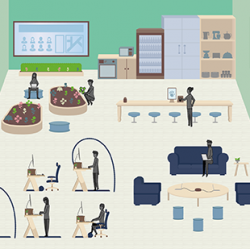February 14, 2017
Level of wellbeing higher for those who ‘wind-down’ into retirement 0
 New research into the effect of retirement on wellbeing commissioned by The What Works Centre for Wellbeing claims that those who gradually reduce their working time with more flexible hours improve their levels of wellbeing. The study looked at all existing research and found that part-time working towards the end of our careers improves life satisfaction. It advises that employers should support older workers to ‘wind-down’ into retirement with bridging jobs or reduce their working hours to avoid poor wellbeing, a new international study reveals. However, the research highlights that this depends on whether employees had control over when they retired, rather than being forced out through ill health or restructuring. If people take up bridging jobs because of financial strain, their wellbeing drops. Even after accounting for income and health, wellbeing is higher for those who have control over the timing or plan for their retirement, and voluntary retirees derive greater pleasure from free time in retirement. On the contrary, wellbeing is lower for those who are involuntarily retired, especially due to health reasons.
New research into the effect of retirement on wellbeing commissioned by The What Works Centre for Wellbeing claims that those who gradually reduce their working time with more flexible hours improve their levels of wellbeing. The study looked at all existing research and found that part-time working towards the end of our careers improves life satisfaction. It advises that employers should support older workers to ‘wind-down’ into retirement with bridging jobs or reduce their working hours to avoid poor wellbeing, a new international study reveals. However, the research highlights that this depends on whether employees had control over when they retired, rather than being forced out through ill health or restructuring. If people take up bridging jobs because of financial strain, their wellbeing drops. Even after accounting for income and health, wellbeing is higher for those who have control over the timing or plan for their retirement, and voluntary retirees derive greater pleasure from free time in retirement. On the contrary, wellbeing is lower for those who are involuntarily retired, especially due to health reasons.









 With the UK facing at best, very slow growth, or even shrinkage, of the working population, future changes to migration levels into the UK due to Brexit could exacerbate the financial stresses and strains caused by the UK’s aging workforce. This is according to the
With the UK facing at best, very slow growth, or even shrinkage, of the working population, future changes to migration levels into the UK due to Brexit could exacerbate the financial stresses and strains caused by the UK’s aging workforce. This is according to the 
























November 10, 2016
If we want to maximise productivity and wellbeing, how many hours should we work? 0
by Mike James • Comment, Flexible working
(more…)